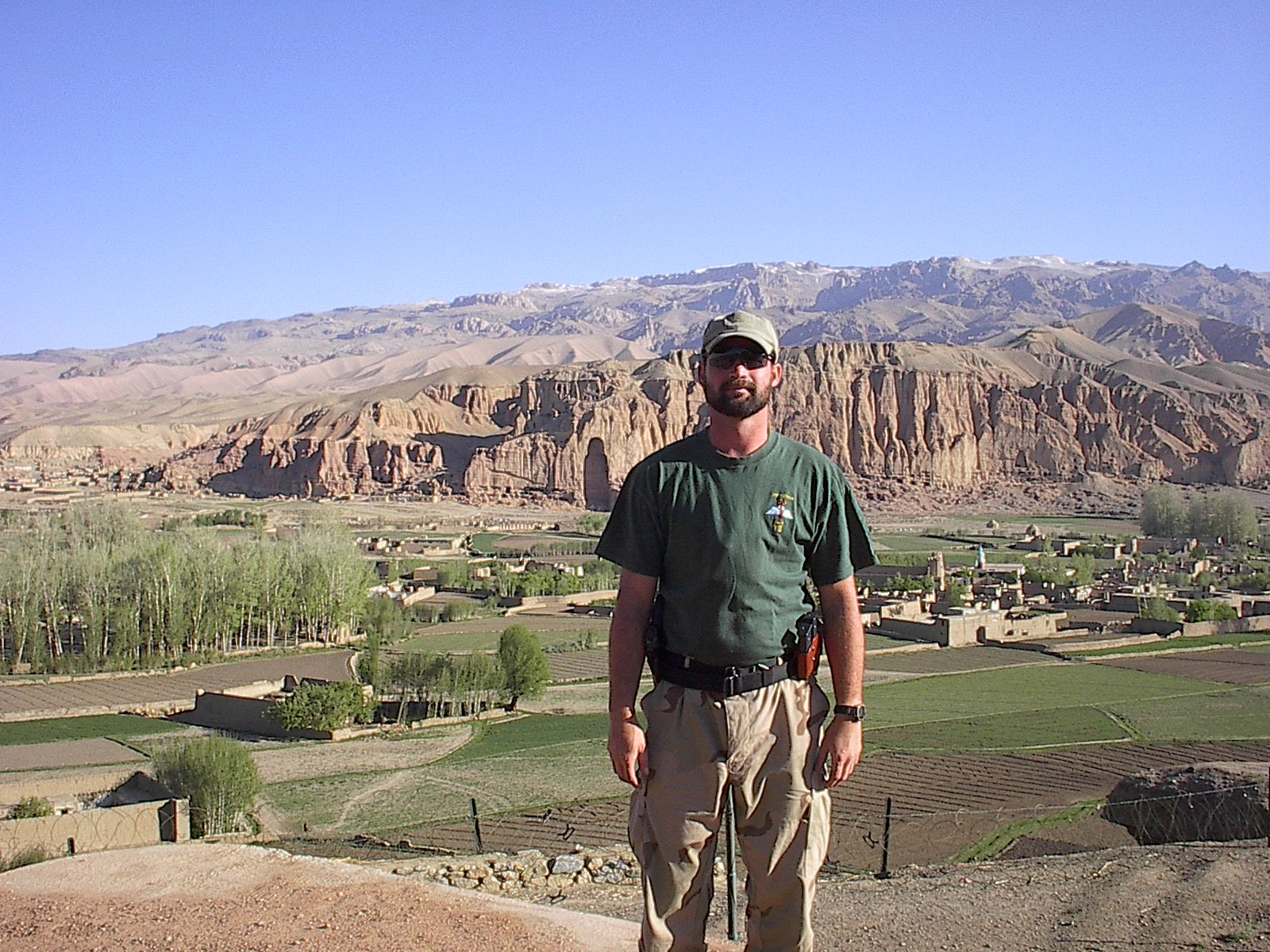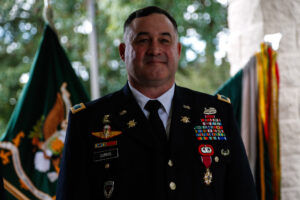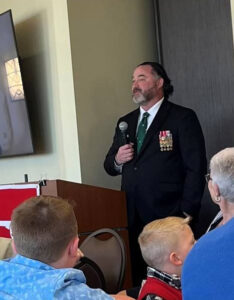
Contact Us if you would like to learn more about how we can help you or your business.
Don’t forget to follow Melanie Borden and The Borden Group on LinkedIn™ for more on all things social media marketing strategy.
Have your past life experiences shaped who you are and what you do? Every experience in my life has led me to the place I am in now. And that encompasses: Who I Am, What I do, and How I Think, which has led me to the Four P’s of Success.

The journey I have taken in life started when I originally enlisted in the Indiana National Guard. Right out of high school. I always knew that I wanted a military career. And being in a military high school, I participated in sports, I was on the drill team, and I participated in other extracurriculars that were military-esque in their methods. Then I enlisted as an infantryman through the Indiana National Guard. I ultimately transferred to the Oklahoma National Guard because that was the closest infantry unit to where I went to college in Arkansas. I went through ROTC and I was in the Guard for about four and a half years. After commissioning I became an artillery officer and made my way through Fort Campbell, Kentucky, with schools at Fort Sill, Oklahoma, and then I went to Baumholder, Germany.
While in Germany, I did a rotation in Bosnia. We were supporting the Dayton Peace Accords. I had two jobs while I was in Bosnia, I was targeting officer and I was what we call an Assistant Fire Support Coordinator (AFSCORD) for Plansr, As a planner and targetier, I got to work with a lot of Special Operations units, Special Forces, Civil Affairs, and Psychological Operations (PSYOP), in particular. And I really liked what they were doing. It intrigued me. You couldn’t go to those types of units until you were a captain. And so, I returned to Germany and commanded a Service Battery, it’s a support unit in the Artillery, and at the end of 2000, we reported to Fort Bragg, North Carolina, to go through the PSYOP course. The PSYOP course was about eight months long, and it ended with language training.

The irony in this was based on my time in Bosnia, I really wanted to learn either Russian or Serbo-Croatian, but they sent me to the Arabic language course. Which was foolish, in my opinion, I didn’t think we’d ever have a reason to use it. But then, a month before I graduated, 9/11 happened. By the end of 2001, I was in Afghanistan. For the next two years, I was in Afghanistan and Iraq., Just after Afghanistan we went to Kuwait in late 2002, I broadcasted a radio station into Iraq from the border until the invasion, and ended up having two back-to-back deployments. After these deployments, I helped train the replacement forces and was selected for a promotion to Major with the opportunity to go to command and general staff college (CGSC), which I did from 2004 to 2005.
I spent the next 12 years traveling to various different locations throughout Europe, Africa, and The Middle East. I commanded a company in Baghdad from 2005 until 2006 and had multiple rotations at our headquarters in Qatar. Then I went back to Kuwait in 2015 for the ISIS Crisis, as part of the headquarters of what would later be called Operation Inherent Resolve. I was part of the ARCENT (Army Central Command) Headquarters for several months before being selected as a Group Commander at Fort Bragg. I was a Group Commander from 2015-2017. When I left command, I became the Commandant for PSYOP at the Special Warfare Center but I was dealing with various injuries and health issues. I was a little bit beat up from spinal fusions, and ultimately forced to retire. I started to heal and do a little bit better physically, I was kind of mad that I wasn’t gonna make it to my mandatory retirement date. Which would have been essentially another two and a half years of service.
At that point, you move out on to civilian life and that transition was difficult because you have to start over. You’re getting settled into a new home, you’re building new relationships, meeting new friends, establishing a new network. At that point, I was completely unemployed. And I quickly realized that I needed to find a task and a purpose. So, a realtor friend of mine introduced me to the Warrior Clan. A lot of what we do is a crisis response for veterans who may be in Crisis, and are having negative interactions with the police and these interactions could go violent. We often speak to them in a way that even a police officer, who was a veteran can’t because they’re in uniform.
So we have three pillars in what we do in that regard. The Warrior Clan provides educational support, classes on suicide prevention, and classes on crisis intervention. We attack substance abuse, and homelessness, and a lot of the key factors that veterans face. We also work with the police and other crisis intervention teams. And finally, we try to build community.
For instance, we have a yearly appreciation and thank you dinner where they invite a lot of the major donors and people who have volunteered their time and effort, their money and things, to our organizations. Every time we do something like this, we do it as a chance to bring together veterans from different communities. In addition to my work with the Warrior Clan, I also worked with different organizations in Kentucky to aid in natural disaster recovery.
 Some friends of mine belong to a religious organization called Shekinah Village, which falls under Meridzo.org They were spending their own time and resources to help deliver supplies throughout Eastern Kentucky, I saw an opportunity in this organization to bring together more veterans. And I said, “If you can find people that we can verify as veterans that also need some help, I can put together a little construction crew or labor force.” So, we found a Veteran who had gotten flooded out in the basement and all of the support structures were old wooden beams that had pretty much rotted out. The home was structurally unsound, and three of the Warrior Clan members drove to this veteran’s house with me and we spent two and a half days up there fixing their basement. We got all of the wooden beams torn out, and put in metal beam support structures to make the house sound again so that he could rebuild it in time. We got a lot of the materials donated to us, and we provided the labor to get it all done.
Some friends of mine belong to a religious organization called Shekinah Village, which falls under Meridzo.org They were spending their own time and resources to help deliver supplies throughout Eastern Kentucky, I saw an opportunity in this organization to bring together more veterans. And I said, “If you can find people that we can verify as veterans that also need some help, I can put together a little construction crew or labor force.” So, we found a Veteran who had gotten flooded out in the basement and all of the support structures were old wooden beams that had pretty much rotted out. The home was structurally unsound, and three of the Warrior Clan members drove to this veteran’s house with me and we spent two and a half days up there fixing their basement. We got all of the wooden beams torn out, and put in metal beam support structures to make the house sound again so that he could rebuild it in time. We got a lot of the materials donated to us, and we provided the labor to get it all done.
When we weren’t working on his house, , we were also doing supply runs between the Shekinah village warehouse, and five or six different distribution sites that were mostly volunteer fire departments, where people could come and get donated items from food and clothes, to footwear, and, whatever was needed at the time. I am really proud of that work, because that’s where I’m originally from, it was nice to give back to what was already a depressed area of the country. When they got hit by the floods, people who didn’t have much of anything, lost everything. And it was humbling to see the sense of community, comradery, and resilience in people.
Bob is a retired U.S. Army Colonel who served in Special Operations with multiple combat tours in GWOT. Bob is the Director of Operations and Planning at the Warrior Clan. To learn more about The Warrior Clan please visit https://warriorclan.org/ or on Facebook https://www.facebook.com/WarriorClan/. To connect with Bob, please visit here https://www.linkedin.com/in/robert-curris-29887188/
You can also learn more about Bob’s work here, in this Military Times Article: The Army needs to invest in psychological operations, not cut them
Contact Us if you would like to learn more about how we can help you or your business.
Don’t forget to follow Melanie Borden and The Borden Group on LinkedIn™ for more on all things social media marketing strategy.
Copyright © 2025 | The Borden Group | All Rights Reserved